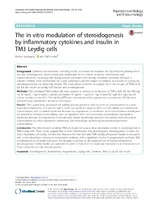| dc.description.abstract | BACKGROUND: Cytokines and hormones, including insulin, are known to modulate the hypothalamic-pituitary-testes
axis and steroidogenesis, both centrally and peripherally. In the context of chronic inflammation and
hyperinsulinaemia mediating male hypogonadism associated with obesity, metabolic syndrome and type 2
diabetes mellitus, these mechanisms are poorly understood and the impact of cytokines and insulin on Leydig cell
steroidogenesis has not been fully elicited. This study aimed to further investigate the in vitro impact of TNFα, IL1ß,
IL6, IL8 and insulin on Leydig cell function and steroidogenesis.
METHODS: hCG-stimulated TM3 Leydig cells were exposed to various concentrations of TNFα, IL1ß, IL6, IL8 (100 ng/
ml, 10 ng/ml, 1 ng/ml and 0.1 ng/ml) and insulin (10 ng/ml, 1 ng/ml, 0.1 ng/ml and 0.01 ng/ml) in optimal cell
culture conditions over 48 h. Cell viability (XTT) and testosterone and progesterone concentrations (ELISA) were
assessed using standardised laboratory techniques.
RESULTS: TNFα significantly decreased cell viability and progesterone and testosterone concentrations in a dosedependent
relationship. IL1ß and IL6 had a subtle but significant negative effect on cell viability and testosterone
concentrations, with a marked significant decrease in progesterone concentration at all concentrations investigated.
IL8 showed an increase in cell viability, with no significant effect on testosterone concentrations alongside a
significant decrease in progesterone concentrations. Insulin significantly increased cell viability and testosterone
concentrations in a dose dependent relationship, but interestingly significantly decreased progesterone
concentrations.
CONCLUSIONS: The inflammatory cytokines TNFα, IL1β and IL6 cause a dose dependent decline in steroidogenesis in
TM3 Leydig cells. These results suggest that chronic inflammation may downregulate steroidogenesis in males via
direct modulation of Leydig cell function. However, IL8 may stimulate TM3 Leydig cell growth. Insulin is associated
with a dose-dependent increase in testosterone synthesis, with a significant decline in progesterone synthesis. With
the phenomenon of insulin resistance, the literature is unclear on the potential role of hyperinsulinaemia in
steroidogenesis. Further studies are warranted in order to fully elicit the molecular mechanisms and interactions of
these molecules on male steroidogenesis. | en_US |
| dc.rights | © The Author(s). 2018 Open Access This article is distributed under the terms of the Creative Commons Attribution 4.0
International License (http://creativecommons.org/licenses/by/4.0/), which permits unrestricted use, distribution, and
reproduction in any medium, provided you give appropriate credit to the original author(s) and the source, provide a link to
the Creative Commons license, and indicate if changes were made. The Creative Commons Public Domain Dedication waiver
(http://creativecommons.org/publicdomain/zero/1.0/) applies to the data made available in this article, unless otherwise stated. | |

